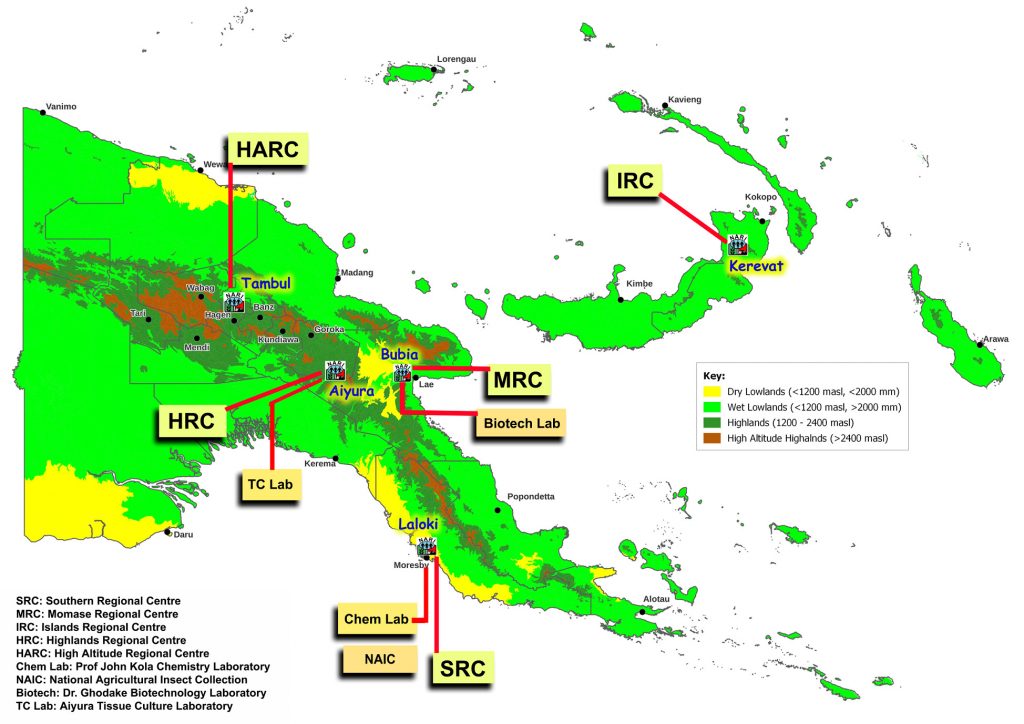
Located at the Sir Alkan Tololo Research Centre, Bubia, outside Lae, Morobe province, the centre is responsible for coordinating AR4D activities for the Momase region. Momase includes Sandaun, East Sepik, Madang and Morobe provinces.
Referred to as the Wet Lowlands Mainlands Programme, its activities primarily cover the wet lowlands, areas with rainfall of greater than 2,000 mm and altitudes ranging from sea level to 1200 metres.
Bubia began as an agricultural extension centre in 1949 and was upgraded to an agricultural experiment centre in 1952. Past research at the centre include: cocoa, sugar cane, peanuts, maize, sorghum, grain legumes, rice, coconut and aibika.
Currently, it serves as the main centre in the lowlands for research on food crops. The focus is on smallholder farmers and farming systems covering main stables such as taro, yam, sweetpotato, rice, and banana. The centre is also the coordinating centre for livestock research.
For more information, contact the Research and Development Coordinator on telephone: 478 4000/478 4100 or email: nari.png@nari.gov.pg.
This centre is based at Aiyura in the Arona valley, Eastern highlands province. Established in 1937, it is the centre of coordination for agriculture research for development (AR4D) for the central highlands region. Aiyura is situated at an altitude of 1664m above sea level and research activities undertaken are representative of regions ranging from 1200 to 1800m above sea level. Major research focus is on food crops (sweet potato), natural resource management, crop protection, and integrated farming systems. Our tissue culture laboratory is also located here.
Referred to as the Highlands Agricultural Experiment Station, the focus of the centre then was on coffee, sustainable agricultural systems (agro-forestry) and crops suitable for replacing coffee as an income earner. The Export Crops Division of the Department of Agriculture and Livestock also used centre for the multiplication and distribution of species such as ginger (Zingiber officinale), cardamom (Eleattaria cardamomum), and chilli (Capscum frutescens).
For more information, contact the Research and Development Coordinator on telephone: 537 3500 Fax: 537 3516 or email: nari.png@nari.gov.pg
The centre is based at Keravat on the Gazelle Peninsula, approximately 40 km from Rabaul in East New Britain province and serves the Island Region. It services the East New Britain, West New Britain, New Ireland, Manus provinces and the Autonomous Region of Bougainville. These provinces comprise a distinct geographic, ethnic and political area with similar flora and fauna. Characterized by having significant areas of plantation agriculture, particularly cocoa, coconuts and oil palm, there is potential for alternative cash cropping. There are some pockets of high population density areas and typical agricultural problems are found on atolls.
This centre is the oldest research station in Papua New Guinea, with its establishment in 1928. It was popularly known and still referred today as the Lowlands Agricultural Experiment Station or LAES. It continues to conduct applied and development orientated research for the wet lowland coastal areas of the New Guinea Islands.
In the last 93 years, the centre has played a major role in the development of agriculture in the country. In particular, it has earned international recognition for its work on cocoa, a major cash crop in the lowlands of PNG. The first hybrid cocoa in the country was distributed from the seed garden at Keravat in 1982 and these hybrids predominate in both smallholder and plantation cocoa blocks throughout the country.
Cocoa related work was transferred to the Cocoa Board in 1986 with the establishment of Cocoa and Coconut Research Institute, also based at Keravat.
The major research focus for LAES is on emerging cash crops, fruits and nuts development, natural resources management, integrated production systems, crop protection, and poultry development. It also serves as the germplasm collection site for a number food and cash crops.
Galip research and development that stands as one of the major highlight of NARI’s AR4D activities is coordinated from this centre. The centre continues the work on galip nut (Canarium idicum) to achieving its aim to commercialising the indigenous nut.
The centre is located at Laloki, Central Province. It is approximately 25 km northeast of Port Moresby, adjacent to the Laloki River and 30m above sea level. Research for development activities of the centre are focused towards the dry-lowlands of PNG. The dry-lowlands have a rainfall of less than 2000 mm, pronounced dry periods with soil moisture stress, typically with man-induced grasslands or savanna. Population densities are low to very low. Agriculture is characterized as low-intensity subsistence.
The Laloki station was established in 1949 and was known as the Laloki Plant Introduction and Quarantine Station (1949 – 1974). In 1984, the station was re-organised to include farming systems research and was referred as the Dry-lowlands Agriculture Experiment Station. Currently known as the Southern Regional Centre, its research for development activities include: plant genetics resources, crop production (short term crops), crop protection and economic studies of vegetables, sweetpotato, banana, yam, cassava, aibika and other food crops.
The centre is also the national germplasm collection site for banana, cassava, yam and aibika.
For more information, contact the Research and Development Coordinator on telephone: 323 5511/3281170 or email: nari.png@nari.gov.pg.
This centre is located in the Tambul Basin, Tambul-Nebyier district, Western Highlands province. It is located approximately 50 km outside of Mt Hagen and services the high altitude areas of the highlands region ranging from 1800 meters above sea level and above.
Current research focus include: food crops (Irish potato, sweetpotato), natural resource management and livestock.
For more information, contact the Research and Development Coordinator on telephone: 74263399/74609973 or email: nari.png@nari.gov.pg.
